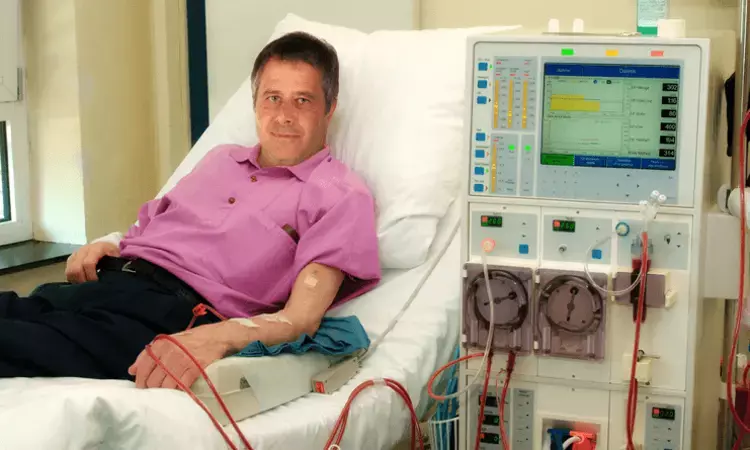- Home
- Medical news & Guidelines
- Anesthesiology
- Cardiology and CTVS
- Critical Care
- Dentistry
- Dermatology
- Diabetes and Endocrinology
- ENT
- Gastroenterology
- Medicine
- Nephrology
- Neurology
- Obstretics-Gynaecology
- Oncology
- Ophthalmology
- Orthopaedics
- Pediatrics-Neonatology
- Psychiatry
- Pulmonology
- Radiology
- Surgery
- Urology
- Laboratory Medicine
- Diet
- Nursing
- Paramedical
- Physiotherapy
- Health news
- Fact Check
- Bone Health Fact Check
- Brain Health Fact Check
- Cancer Related Fact Check
- Child Care Fact Check
- Dental and oral health fact check
- Diabetes and metabolic health fact check
- Diet and Nutrition Fact Check
- Eye and ENT Care Fact Check
- Fitness fact check
- Gut health fact check
- Heart health fact check
- Kidney health fact check
- Medical education fact check
- Men's health fact check
- Respiratory fact check
- Skin and hair care fact check
- Vaccine and Immunization fact check
- Women's health fact check
- AYUSH
- State News
- Andaman and Nicobar Islands
- Andhra Pradesh
- Arunachal Pradesh
- Assam
- Bihar
- Chandigarh
- Chattisgarh
- Dadra and Nagar Haveli
- Daman and Diu
- Delhi
- Goa
- Gujarat
- Haryana
- Himachal Pradesh
- Jammu & Kashmir
- Jharkhand
- Karnataka
- Kerala
- Ladakh
- Lakshadweep
- Madhya Pradesh
- Maharashtra
- Manipur
- Meghalaya
- Mizoram
- Nagaland
- Odisha
- Puducherry
- Punjab
- Rajasthan
- Sikkim
- Tamil Nadu
- Telangana
- Tripura
- Uttar Pradesh
- Uttrakhand
- West Bengal
- Medical Education
- Industry
In patients with advanced CKD, dyskalemias tied with increased hospital visits: Study

In patients with advanced chronic kidney disease (CKD), dyskalemias are associated with a higher risk of hospital/ emergency room (ER) visits, according to a recent study published in the Journal of Managed Care & Specialty Pharmacy.
Patients with advanced chronic kidney disease (CKD) are at high risk for dyskalemias, which may induce arrhythmias that require immediate emergent or hospital care. The association of dyskalemias with short-term hospital/emergency room (ER) visits in advanced chronic kidney disease (CKD) is understudied.
A study was conducted to assess the association of dyskalemias with short-term hospital/ER visits in advanced chronic kidney disease (CKD) population.
From among 102,477 US veterans transitioning to dialysis from 2007 to 2015, we identified 21,366 patients with 2 predialysis outpatient eGFR < 30 ml/min/1.73m2 90-365 days apart (with the second eGFR serving as the index date) and at least 1 potassium (K) in the baseline period (1 year before index) and 1 outpatient K (oK) in the follow-up (1 year after the index but before dialysis initiation). We examined the association of time-varying hypokalemia (K < 3.5 mEq/L) and hyperkalemia (K > 5.5 mEq/L) vs referent (3.5-5.5 mEq/L) with separate hospital and ER visits within 2 calendar days following each oK value over the 1-year follow-up period from the index. We used generalized estimating equations with binary distribution and logit link to model the exposure-outcome relationship adjusted for various confounders. We conducted various subgroup and sensitivity analyses to test the robustness of our results.
Results:
Over the 1-year follow-up, 125,266 oK measurements were observed, of which 6.8% and 3.7% were classified as hyper- and hypokalemia, respectively. In the multivariable-adjusted model, hyperkalemia (adjusted odds ratio [aOR] = 2.04; 95% CI = 1.88-2.21) and hypokalemia (aOR = 1.66; 95% CI = 1.48-1.86) were associated with significantly higher odds of hospital visits. Similarly, hyperkalemia (aOR = 1.83; 95% CI = 1.65-2.03) and hypokalemia (aOR = 1.24; 95% CI = 1.07-1.44) were associated with significantly higher odds of ER visits. Results were robust to subgroups and sensitivity analyses.
Thus, in patients with advanced CKD, dyskalemias are associated with a higher risk of hospital/ER visits. Interventions targeted at lowering the risk of dyskalemias might help in reducing the health care utilization and associated economic burden among patients with advanced chronic kidney disease (CKD) experiencing dyskalemias.
Reference
Dashputre AA, Gatwood J, Sumida K, et al. Association of dyskalemias with short-term health care utilization in patients with advanced chronic kidney disease (CKD) published in the Journal of Managed Care & Specialty Pharmacy. 27(10):1403-1415.
Dr. Shravani Dali has completed her BDS from Pravara institute of medical sciences, loni. Following which she extensively worked in the healthcare sector for 2+ years. She has been actively involved in writing blogs in field of health and wellness. Currently she is pursuing her Masters of public health-health administration from Tata institute of social sciences. She can be contacted at editorial@medicaldialogues.in.
Dr Kamal Kant Kohli-MBBS, DTCD- a chest specialist with more than 30 years of practice and a flair for writing clinical articles, Dr Kamal Kant Kohli joined Medical Dialogues as a Chief Editor of Medical News. Besides writing articles, as an editor, he proofreads and verifies all the medical content published on Medical Dialogues including those coming from journals, studies,medical conferences,guidelines etc. Email: drkohli@medicaldialogues.in. Contact no. 011-43720751


